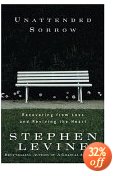What does unattended sorrow look like? It is like a low-grade fever; it troubles
our sleep and drains away our days; it scatters intuition and creates an underlying
anxiety; it sours the eye and leaves a distaste in the mouth; it's the vague
uncertainty that permeates every thought before every action; it's the heart
working as hard as it can.
It's what most of us carry with us from day to day.
And it's what renowned grief counselor Stephen Levine, author of Who Dies?
and A Gradual Awakening, focuses on here. He writes that long after the initial
loss has passed and the "period of grieving" has ended, an unattended sorrow
lingers, accounting for a host of physcial, emotional, and spiritual maladies.
It's not uncommon, then, for those with unresolved grief to lean towards
addictions or dangerous behaviors or other forms of self-destruction.
Levine addresses the grief from fresh loss but also attends to the pain
and troubles caused by the unresolved anguish, sadness, and delayed stress
that can accumulate over a lifetime--whether it's angst caused by death, the
loss of self-identity, childhood abuse, illness, divorce, or even just being
alive in today's world.
Levine notes that though we may never wholly overcome the sorrows we've
endured, we can confront them with mercy and self-acceptance that smoothes the
path to healing the heart.
Author
Stephen Levine is the best-selling author of many books. With his wife, Ondrea,
he has counseled terminally ill people and their loved ones for more than 30 years.
His renowned work in grief counseling has, for the past 25 years, inspired radio
segments and interviews as well as magazine articles, including pieces in O: The
Oprah Magazine, Psychology Today, and the Utne Reader. Selected workshops, interviews,
and talks are regularly aired on PBS and several Canadian networks. He and Ondrea
live in the mountains of northern New Mexico. Stephen's tapes and videos are available
through warmrocktapes.com
Reviews
"Stephen's work is magic. His work with the grieving and dying is amongst the most skillful and compassionate that I am aware of."
--Elisabeth Kübler-Ross, M.D.
"My heart lifted and my spirits rejoiced on reading this divinely inspired book. Unattended Sorrow is going to be so important in the literature of moving forward after loss."
--Judy Collins
"There is no one better to turn to in times of loss than Stephen Levine. This book is an invaluable tool for anyone recovering from any type of major loss. A must, must read."
--Richard Carlson, Ph.D., author of Don't Sweat the Small Stuff . . . and It's All Small Stuff and What About the Big Stuff?
"Awareness is the first step in healing. In this magnificent book, Stephen Levine shines a bright light in the dark places in our souls. He brings to awareness the many ways in which we accumulate sadness, anger, and grief that keep us from living life as joyfully and fully as an open heart can bring. At a time when the world seems to full of sadness and fear, this book, so beautifully written, is a major force for healing."
--Dean Ornish, M.D., author of Dr. Dean Ornish's Program for Reversing Heart Disease and Love & Survival, founder and president of the Preventive Medicine Research Institute, Clinical Professor of Medicine, University of California, San Francisco
"Your heart and soul can be made whole again, be rejuvenated, and best of all, you can now overcome sorrow. All this is thanks to the gentle, insightful, user-friendly wisdom of my friend, Stephen Levine."
--Mark Victor Hansen, co-creator, #1 New York Times best-selling series Chicken Soup for the Soul®, co-author, The One Minute Millionaire
Excerpt
The following is an excerpt from the book Unattended Sorrow: Recovering
from Loss and Reviving the Heart
by Stephen Levine
Published by Rodale; February; $23.95 US; 1-59486-065-3
Copyright © 2005 by Stephen Levine
A DAY IN THE HEART OF PAIN
WHAT WOULD IT BE LIKE TO AWAKEN TO A DAY WITH OUR HEARTS
open to our pain?
What would it be like to approach the mean habit of rejecting our pain,
which turns it into suffering, with mercy and awareness? When we are no longer
mesmerized by our wounds or making a religion of the pain by which we so often
define ourselves, we stop running for our lives.
Some years ago, sitting next to a fifteen-month-old child whose cancer had begun
in her mother's womb, as I prayed for her life, some- thing very deep inside told me
to stop, that I didn't know enough to make such a prayer. It said that I was just
second-guessing God. That I could not really comprehend what her spirit might have
needed next, that only this pain in this fleeting body, which was being torn from
the hearts of her loved ones, might teach her as she evolved toward her ceaseless
potential. That she, like us all, was in the lap of the mystery, and that the only
appropriate prayer was, "May you get the most out of this possible!"
Sharing our healing, we send wishes for the well-being of all those who,
like ourselves, find themselves in a difficult moment, as the heart whispers,
"May we all get the most out of this possible."
And we can say to ourselves, in appreciation of the healing potential of
approaching with mercy and awareness that which so recently may have been an
aversion to our situation, "May I get the most out of this possible."
It is said that nothing is true until we have experienced it, so as an experiment
in sending love where the fear is, we can use the presence of mild pain to test the
truth of softening and sending mercy into an area of our body that is perhaps captured
in the constriction of fear. Knowing that working with physical pain demonstrates a
means of working with mental pain as well, we can let go of the tension around physical
discomfort.
If you watch closely, you'll notice that when you experience physical pain, you
ostracize and isolate that part of yourself. You close off what is calling out for
your help. We do the same thing with our grief.
When you stub your toe, more than physical pain is generated; grief is released
into the wound, followed by a litany of dissatisfactions and "poor me's," a damning
of God sent heavenward. When we trip and fall in the darkness we are all too ready
to curse ourselves for being so clumsy, as well as for not being able to hold our
bladder until dawn, for not counting the hours in our just-expended 1,000-hour
lightbulb, and the bruise is suffused with self-judgment and an irrational sense
of responsibility.
The next time you have a minor wound, such as a stubbed toe or bumped elbow,
note how long it takes that wound--when you soften to it and use it as a focus
for loving kindness--to heal. Then compare it with the number of days it takes a
similar wound to heal when you turn away from it, allowing the fear and resistance
that rushes toward it to mercilessly remain. Contrast the healing of an injury in
the mind or body in which loving kindness has gradually gathered to one that has
been abandoned.
This softening and opening around pain has been shown in several double-blind
studies to provide greater access of the immune system to an area of injury. It opens
the vice of resistance into a never-considered acceptance of the moment. It denies
hopelessness a home. It proves we are not helpless, that we can actively intercede
in what we previously believed we had only to endure.
Working with our pain, or the pain of loved ones, cultivates a mercy that allows
us to stay one more moment at their bedside when we are most needed. It allows us to
not run away.
To open some of our healing potential, soften around the pain to melt the
resistance that isolates it. Enter it with mercy, instead of walling it off with
fear. Pass through the barricades of fear and distrust that attempt to defend the
pain. Let what seems an improbable love--the ultimate acceptance of our pain--enter
the cluster of sensations that so agitate the mind and body.
It takes patience to let go of doubt. So many fears warn us against opening beyond
the numbness that surrounds pain. But when we allow ourselves to be open to and
investigate these fears, we come to see them and our negative attachment to them,
our compulsive warring with them, as a great unkindness to ourselves. As we open
into our pain we may weep with gratitude when at last the pain does not so much
disappear as become dispersed through the gradually expanding spaciousness of
awareness.
As pain teaches us that fear can be penetrated by mercy and awareness, from some
inherent knowing there resonates from our suffering a perfect teaching in compassion.
We find in our pain the pain we all share. Softening around pain with mercy instead
of hardening it with fear, the heart expands as "my' pain becomes "the" pain. Odd
as it may sound, when we share the insights arising from our pain we become more
able to honor the pain.
Following a tributary from the personal to the universal, we can find in our
pain the pain of others as well. In our own wish to be free of suffering, others
are calling out to be freed from their difficulties. Finding them in ourselves, the
loving kindness that we extend to all sentient beings moves Earth toward heaven.
When we meet pain with mercy, there is a silent sigh of understanding and relief that
can serve the whole world. There is exposed a meaning to life, a connection through
ourselves to all others, that proposes a balm to the suffering in the world.
 "Unattended Sorrow: Recovering from Loss and Reviving the Heart"
"Unattended Sorrow: Recovering from Loss and Reviving the Heart"
Reprinted from Unattended Sorrow: Recovering from Loss and Reviving the Heart by
Stephen Levine © 2005 by Stephen Levine. Permission granted by Rodale, Inc.,
Emmaus, PA 18098. Available wherever books are sold or directly from the publisher
by calling (800) 848-4735 or visit their website at: Rodalestore

